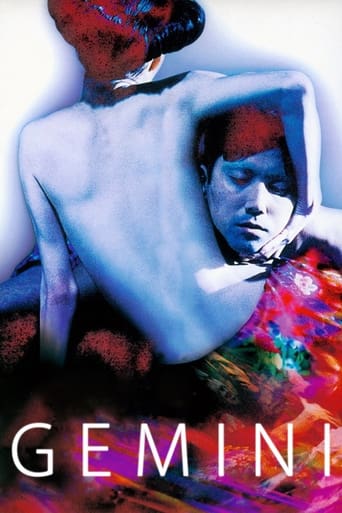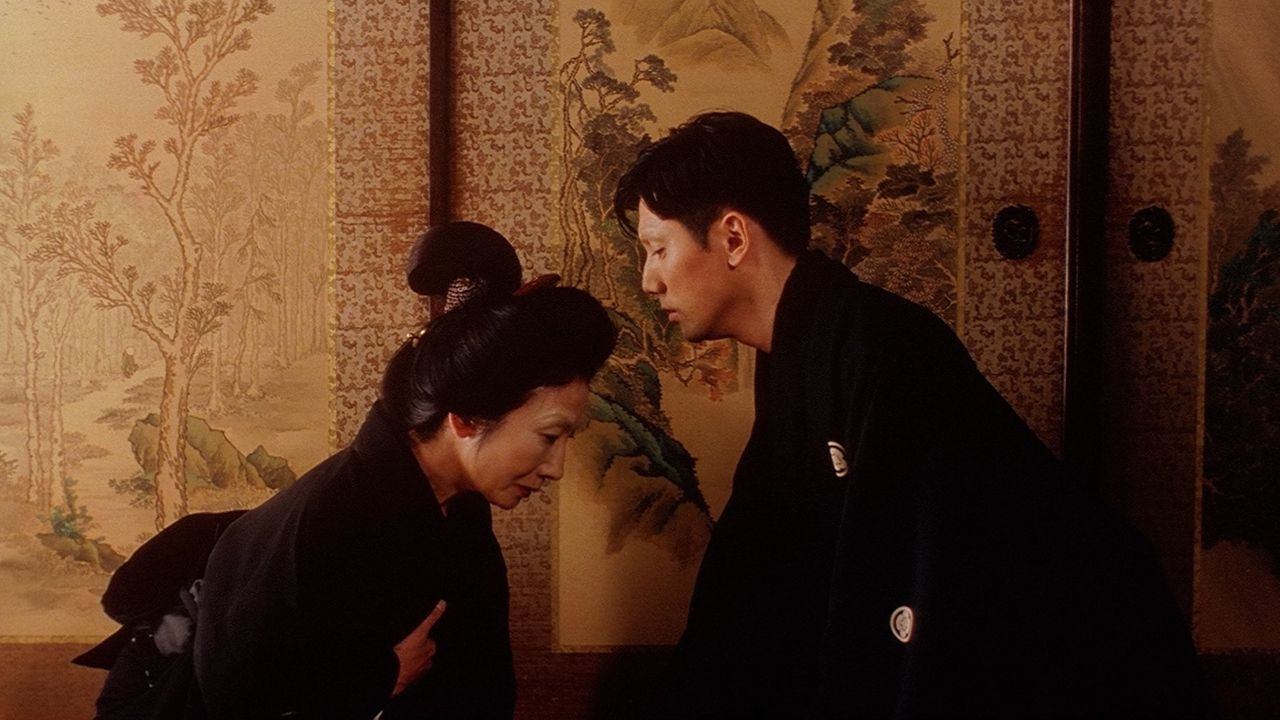EVOL666
I started watching Gemini several years ago but never finished it for some reason. As I'm making a point to go through my unwatched film collection, I decided to give it another go. The storyline concerns the eyebrow-challenged couple of Yukio and Rin. Yukio is a young doctor and Rin is his (supposedly) amnesiac wife. Things get really strange for the couple when a man that looks just like Yukio shows up...I have very mixed feelings about this one. Overall I'd say that I liked it-but I felt it could have been much stronger if it wouldn't have veered off into weirdo-territory the way so many '90s era Japanese films seem to do. The storyline is actually pretty straight-forward by the time you get to the end-but the atmosphere of the beginning is lost with a bunch of weird and garish costuming that felt nearly comical to me. I personally feel the first third of the film is really quite fantastic. During that segment-there's a constant feeling of anxious, near-dread that is almost early Cronenberg-ish in nature. Problem is-that feeling of suspense and general 'creepiness' dies quickly because the film becomes, well...too 'Japanese' for lack of a better term. Don't get me wrong-I'm typically quite fond of Japanese films and their often peculiar style-but in this one, it felt forced. I guess I shouldn't be surprised coming from the director of the TETSUO films-and he does show far more restraint in GEMINI-but it just wasn't enough. I honestly think this could have been a really fantastic film that just really misses the mark for me. Still a decent film-just not a great one. 6.5/10
Scarecrow-88
Class *warfare* I felt was at the heart of this thriller from acclaimed cult director Shinya Tsukamoto regarding unstable Sutekichi(Masahiro Motoki) with a scar on his leg(..who was abandoned by his parents, found floating across a river and brought up by a theatrical troupe performer, living as a thief in the slums) who tosses his successful, respected and prominently regarded doctor twin brother Yukio into his family's well, assuming his identity. Sutekichi is essentially responsible for the deaths of their parents, but his ulterior motive is re-entering the life of Rin(Ryô)who was once his lover and partner in the slums, with them separated after their thievery leads to possible trouble for the troupe when a man comes seeking revenge for what they did to his family after stealing jewels. Sutekichi has studied Yukio's mannerisms and habits, perfectly embodying him with no one, except Rin(..who has been manipulating Yukio into thinking she's an amnesia case with no history she can recall)knowing who he really is. Sutekichi visits Yukio from time to time, to drop food scraps or for to torment and ridicule him. Over time, Yukio, in a sense, switches roles with Sutekichi, understanding what it was like from his point-of-view. There's a choice Yukio makes regarding whether to treat a drunken mayor who stumbled onto a spike which plunged into his chest, or a dirty, possibly plague-infested mother whose child needs help. Choosing the mayor, symbolically siding with the higher class instead of the poor, Yukio will swallow a bitter pill when his brother takes him away from the comforts of living, placing him in a horrifying situation of confinement, hunger, and filth..there seems to be no escape as he looks up at his brother, who teases about ruining his practice and making love to his wife. And, among the pile of burdens is the knowledge that Sutekichi may've been responsible for the deaths of his parents. Tsukamoto has always brought a collection of directorial styles, his camera can sit still, smoothly glide, follow the actions of a situation feverishly..whatever is taking place in the story, Tsukamoto has a certain way of conveying it. We get a look at two worlds, the proper, quiet life of a man of prestige and wealth, and the ugly, loud and scuzzy world of the slums..quite a contrast that really benefits the story as the lives of the twin brothers come full circle and both get an understanding as to what life is like in the other's shoes. Rin is the middle woman, who left the old world through an identity switch reaping the benefits of a much more healthier world, but inside longing for the life she once had, her love for Sutekichi just as strong as ever. As always Tsukamoto brings an uneasy atmosphere and the character arcs are stunning to behold, exploring the psychological terrain of what can transform a person when placed in a difficult situation(..all the three of the principals)whether it be for the betterment or detriment of their existence.
Matthew Janovic
Shinya Tsukamoto's take on a Meiji era "Cask of Amantillado", and the parable of Cain and Abel, is possibly one of the best Japanese horror-films ever lensed. There are no supernatural-elements, only the landscape of tormented human-souls. This was a for-hire film for Tsukamoto, and was released through Toho studios. For a director who has often expressed his love for the Toho monster films, it was a dream-come-true, and it did well in Japan. The film was originally slated to be less than feature-length, but because of the director's resourcefulness, it was lengthened to a running-time of 83-minutes. I originally thought the film was a little short, but there-it-is. More amazing is the fact that Tsukamototo was director, editor, writer and cinematographer! Perfection is achieved in all-areas.While based on a story by the noted Japanese author, Edogawa Rampo, Tsukamoto has made a tale that is more his own. First, he changed the setting of the period-piece from the Showa era (1920s), to the late Meiji era when poverty was more-obvious in Japanese society. He also changed a major plot-point: in Edogawa's original, the doppleganger-brother (Sutekichi) murders his brother, throws him into a disused-well, and steals his identity permanently. Tsukamoto's revisions allow-for much more by the survival of the brother (Yukio), and is more realist since the Sutekichi would have to learn all the medical-knowledge Yukio knows. This would push the story into the realms of the supernatural or the absurd. But, the truth is, this is the oldest-story told. The real trick is making it one's own, and the director achieves this with his running-theme of the love-triangle, and a feminine-wisdom that teaches the male-protagonists something they could never learn otherwise. As-usual, there are also the themes of class and one's standing and honor in Japanese society.It should be noted that the Japanese have been very-obsessed with an aesthetic for purity and order (like Germans?), and this extends to people. Even today, survivors and the children of Hiroshima and Nagasaki are discriminated-against for being "contaminated" and "impure". In the late Meiji era, it was much-worse. The children of the wealthy would be abandoned, just as the brother, Sutekichi. His serpentine-birthmark causes his removal by his purity-obsessed parents, and he is the "bad-seed" to them. The story isn't a long-stretch, and one has to imagine how the real outcasts reacted. And yet, this is still a parable about Japanese society, which has a strangely universal-appeal. Gemini has a tension to it that resembles Poe's stories, and it is also about the psychology between people. Sutekichi is the monster of this tale, but he was created-by his parents who abandoned-him near the slums. Sutekichi is raised, and taught by a thief to survive, much like an animal. His visage, covered in filth and rat-pelts, is terrifying. He scarcely looks human, a shadow-image of the successful doctor, Yukio. Sutekichi represents the oppression of Japan's violent, disordered-past from the eras of the Shogun and the Samurai. Yukio represents the emergence of a modern Japan, with his work as a doctor and his bourgeois life with his new-wife, Rin. He toils helping cure the rich and the poor alike, and is a hero as a field-doctor in the Russo-Japanese war (1904-1905). This is important: it was the war that ushered-in Japan as a modern nation, and was the first time that a Western power was defeated by an Asian one. This is about a new Japan.And yet, the story is creepy. Sutekichi murders his mother and father dressed as a shaman or ghost from traditional Japanese-lore. Also, Yukio and Sutekichi are identical-in-appearance. He is an apparition of the past. Also, the doppelganger is universal as an occult-symbol of death and the unknown, and this is perhaps why the film has a wider-appeal. By the end, it's clear that Yukio must absorb his brother to become whole. In killing his brother, there is a union of the past and present. He has understood the depravity of the slums by festering in the well, and he has understood the crimes of his parents. Rin also plays her part in educating Yukio what it is to be poor and desperate--to live like an animal. The doctor will return to his practice a full-man, but there is an ambivalence, as he also looks menacing striding towards the camera. It is very-much like the ending of Scanners, and so, the connection with Cronenberg remains.
Red Zebra
After having been impressed by the Tetsuo series, Gemini was all I was hoping for and much more. The cinematography is some of the most beautiful and evocative I've seen, with wonderful use of colour, light and design. Though I'd been told this movie was not "cyberpunk" like testsuo, in a way it had a similar ethic, questioning "what makes a person a person", although in this case it's more about what makes one "good or evil". I saw it the same night as I saw another popular Japanese horror, "The Ring", which curiously also features a well, but I found Gemini much more sinister and frightening.


 AD
AD



